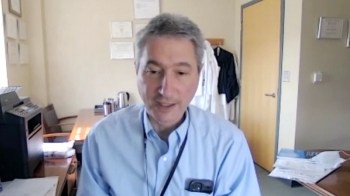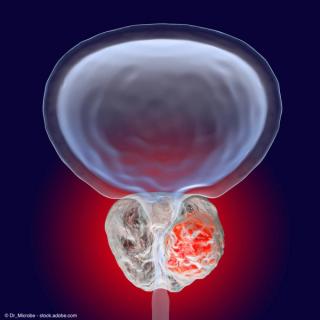
Prostate Cancer
Latest News
Latest Videos

CME Content
More News

"I would say our greatest advance of the past 30 years is our clinical trials infrastructure, because we can now use our therapies with intelligence," says Anthony Zietman, MD.

Authors from the OSPREY clinical trial highlight the key take-home messages from the trial outcomes.

Key opinion leaders review the OSPREY clinical trial studying PSMA PET scans for prostate cancer imaging.

"My experience with patients who are on surveillance, who meet the criteria for active surveillance, [is that they] tend to be younger and healthier patients, so I don’t see why not," says one urologist.

"It’s important to recognize that there has been a shift in the way we approach ADT," says David F. Jarrard, MD.

“I think we are good at treating the cancer but maybe not great at treating the patient as a whole. And that is an area that we can improve going forward based on research like this,” says Amy N. Luckenbaugh, MD.

“We kind of expected that treatment type wouldn't make a ton of difference in terms of…mental health outcomes after either surgery or radiation…but we were very clearly able to find groups of people who were at risk for poor mental health outcomes,” says Amy N. Luckenbaugh, MD.

Initial data from the phase 1/2a modular PETRA trial showed that the next-generation highly selective PARP1 inhibitor AZD5305 had comparable safety and promising clinical activity compared with first-generation PARP inhibitors.

Doctors present the patient profile of a 66-year-old man with high-risk localized prostate cancer.

Michael Gorin, MD, describes his experiences with prostate cancer imaging both in academia and community-based practices.

"Throughout the years, I've said it's not hard to destroy tissue; it's hard to destroy tissue without destroying other things around [the cancer]," says J. Stephen Jones, MD, FACS.

"Cryotherapy was the first energy source that we were able to ablate tissues with in either the kidney or prostate and understand what that ablation would do," says J. Stephen Jones, MD, FACS.

Robert Dreicer, MD, discusses the intensification of androgen-deprivation therapy with androgen receptor pathway inhibitors in patients with metastatic castration-sensitive prostate cancer.

“We would have monthly multidisciplinary meetings to pick each other’s brains for tips we can use to get patients home more safely and quickly after surgery,” says Lee.

Neal D. Shore, MD, discusses findings from the ARAMIS trial showing that patients with nmCRPC who have multiple comorbidities still respond well to darolutamide.

The study found that 1 in 10 men with localized prostate cancer experienced treatment-related regret.

New subcutaneous formulation of leuprolide mesylate officially launches in US prostate cancer market
The ready-to-inject formulation was approved by the FDA in May 2021.

An explanation of the importance of clinical providers following a multidisciplinary approach for prostate cancer management.

Experts review ongoing clinical trials in PSMA PET technology.

Urology Times interviewed co-author Fred Saad, MD, FRCS, on the importance of the ARASENS trial and the potential of triplet therapy as the future standard of care for metastatic hormone-sensitive prostate cancer.

“People's concepts of immunotherapy are unfortunately quite distorted. It is not just about checkpoint inhibitors,” says Susan F. Slovin, MD, PhD.

William K. Oh, MD, discussed oligometastatic prostate cancer in a recent presentation at the 2022 New York GU Interdisciplinary Prostate Cancer Congress and Other Genitourinary Malignancies.

“One of the most exciting areas of research in sexual health are new improvements on penile implants,” says Marta Skrodzka, MD.

According to Dreicer, standard treatment in this setting for most patients should include androgen deprivation therapy (ADT) in combination with 1 or 2 other agents vs ADT therapy alone.

“I would suggest a discussion with your medical oncology colleagues, just so that you and your staff know what to expect in the short term and the long term,” says Susan F. Slovin, MD, PhD.













